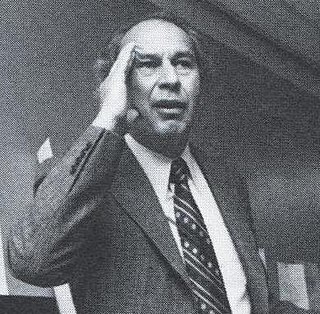A Quote by May Sarton
A man with a talent does what is expected of him, makes his way, constructs, is an engineer, a composer, a builder of bridges. It's the natural order of things that he construct objects outside himself and his family. The woman who does so is aberrant. We have to expiate for this cursed talent someone handed out to us, by mistake, in the black mystery of genetics.
Related Quotes
The fact that labour is external to the worker, i.e., it does not belong to his intrinsic nature; that in his work, therefore he does not affirm himself but denies himself, does not feel content but unhappy, does not develop freely his physical and mental energy but mortifies his body and his mind. The worker therefore only feels himself outside his work, and in his work feels outside himself.
The analytical writer observes the reader as he is; accordingly, he makes his calculation, sets his machine to make the appropriate effect on him. The synthetic writer constructs and creates his own reader; he does not imagine him as resting and dead, but lively and advancing toward him. He makes that which he had invented gradually take shape before the reader's eyes, or he tempts him to do the inventing for himself. He does not want to make a particular effect on him, but rather enters into a solemn relationship of innermost symphilosophy or sympoetry.
If the artist does not fling himself, without reflecting, into his work, as Curtis flung himself into the yawning gulf, as the soldier flings himself into the enemy's trenches, and if, once in this crater, he does not work like a miner on whom the walls of his gallery have fallen in; if he contemplates difficulties instead of overcoming them one by one ... he is simply looking on at the suicide of his own talent.
Thank you," the young mother said again. "Thank you." "The Black Tower protects," Logain heard himself say. "Always." "I will send him to you to be tested when he is of age," the woman promised, holding her son. "I would have him join you, if he has the talent." The talent. Not the curse. The talent.
Therefore, the truly great man, although he does not injure others, does not credit himself with charity and mercy (these are natural to him). He does not seek gain, but does not despise his followers who do. He struggles not for wealth, but does not take credit for leaving it alone... The ranks and emoluments of the world are to him no cause for joy, it's punishments and shame no cause for disgrace.
At one time I thought the most important thing was talent. I think now that the young man must possess or teach himself, training himself, in infinite patience, which is to try and to try until it comes right. He must train himself in ruthless intolerance-that is to throw away anything that is false no matter how much he might love that page or that paragraph. The most important thing is insight, that is to be-curiosity-to wonder, to mull, and to muse why it is that man does what he does, and if you have that, then I don't think the talent makes much difference, whether you've got it or not.
He who does not meditate acts as one who never looks into the mirror and so does not bother to put himself in order, since he can be dirty without knowing it. The person who meditates and turns his thoughts to God who is the mirror of the soul, seeks to know his defects and tries to correct them, moderates himself in his impulses and puts his conscience in order.
It is God's earth out of which man is taken. From it he has his body. His body belongs to his essential being. Man's body is not his prison, his shell his exterior, but man himself. Man does not "have" a body; he does not "have" a soul; rather he "is" body and soul. Man in the beginning is really his body. He is one. He is his body, as Christ is completely his body, as the Church is the body of Christ
A man is the prisoner of his power. A topical memory makes him an almanac; a talent for debate, disputant; skill to get money makes him a miser, that is, a beggar. Culture reduces these inflammations by invoking the aid of other powers against the dominant talent, and by appealing to the rank of powers. It watches success.
The Christian religion, outwardly and even in intention humble, does, without meaning it, teach man to regard himself as the most important of all created things. Man surveys the starry heavens and hears with his ears of the plurality of worlds; yet his religion bids him believe that his alone out of these innumerable spheres is the object of his master's love and sacrifice.
But then if you lied to a man about his talent just because he was sitting across from you, that was the most unforgivable lie of them all, because that was telling him to go on, to continue which was the worst way for a man without real talent to waste his life, finally. But many people did just that, friends and relatives mostly.






































